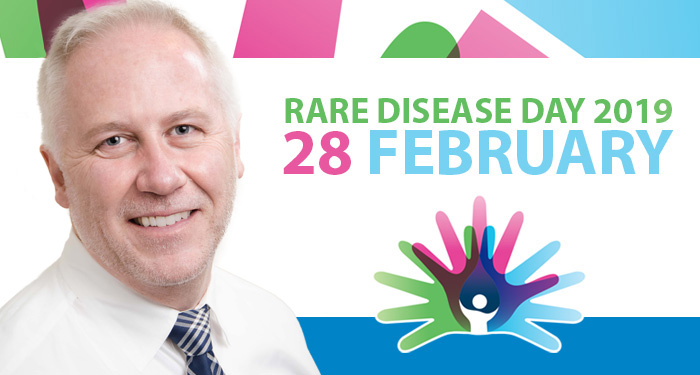“Rare” is not so rare
Message from Dr. Christopher McMaster

February 28th (or, on a leap year, the 29th) is Rare Disease Day; the rarity of this day providing an opportunity to bring visibility to rare diseases.
A rare (or “inherited”) disease is generally defined as one that is found in less than 1 in 2,000 people. That said, it is currently estimated that 1 in 15 children is born with a rare disease. Furthermore, 75% of rare diseases manifest in childhood, and 1 in 4 pediatric hospital beds is thought to be occupied by a child with a rare disease. For comparison: childhood cancer has an incidence of 1 in 1,500, making rare diseases 100-fold more prevalent.
Currently, most rare-disease mortality and morbidity numbers (and corresponding hospital and healthcare usages) are merely estimates. Obtaining accurate data for the socioeconomic cost of inherited diseases is a challenge in Canada–and worldwide–as rare diseases are not coded in the ICD-10 system (International Statistical Classification of Diseases and Related Health Problems, 10th ed.): the World Health Organization’s reference guide widely used to determine patient diagnosis and treatment.
There is renewed hope for rare-disease patients. Most rare diseases are genetic, and a revolution is underway in genetics and genomics. The first human genome was completed in 2003 and took 10 years and over $3 billion to complete; while in 2019, a human genome can be sequenced for hundreds of dollars in a few days. This rapid decline in the cost of sequencing genomes has enabled a truly incredible increase in the number of human gene mutations that cause rare diseases to be determined; from under 100 over a decade ago, to over 4,000 currently (of the predicted ~7,000). The drawn-out, diagnostic odyssey most rare-disease patients undergo (5-7 years to obtain a diagnosis, and costing tens of thousands of dollars in tests) is nearing an end. This significant reduction to timeline and cost is now enabling more rare-disease patients to be diagnosed sooner.
Coupled with the increase in diagnostic rate for rare-disease patients is the fact that ICD-11 was recently released, with provisos to track the status of inherited/genetic diseases. Armed with these new tools, the Institute of Genetics will be undertaking an examination of the socioeconomic burden of inherited disease. This is a major missing piece of information that is incredibly important to patients, their families, and the Canadian healthcare system at large. Indeed, this is required information for appropriate resource allocation for national and provincial health research and healthcare strategies, as well as for determining accurate and proportional pricing guidelines for therapies for rare diseases.
Succinctly, if a child with a rare disease is not counted; they do not count.
Rare Disease Day gives us the opportunity to bring visibility to this critical issue. With advances in genetics and genomics, we have the ability to ensure that rare diseases arediagnosed and treated more efficiently and effectively, and we aspire to see this integrated in Canadian healthcare delivery.
So spread the word and raise awareness! Check out what our friends in Canada and around the world are doing to mark Rare Disease Day 2019.
- Date modified: